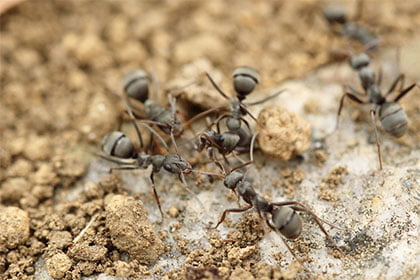When we visit an insectarium, seeing ants working together to get food is nice and impressive. When we are at home, it is a little less so. However, to our dismay, sand ants (among others) do not need a formal invitation to visit us in our homes. They simply enter, ignoring the frustration they cause us. Fortunately, there are solutions to this problem. In this article, we will examine 1) some characteristics of this insect, 2) how to know if he is our new roommate and 3) ways to prevent and treat its arrival in our home.
What are sand ants?
Sand ants, also called pavement ants, are very numerous in Quebec, and thus easily recognizable. None of you could honestly say that you have ever seen one! With its brown body measuring 3 to 4 mm (or 7 to 8 mm in the case of the queen), this ant could seem harmless. However, multiply it by 10,000 and you have an invasive colony. Beware: if the latter is polygynous (two or more queens), it can have up to 50,000 workers. Quite a gathering!
Do I have sand ants in my house?
Actually, the answer to that question is quite simple. Naturally, if you see ants moving around your home, the problem is obvious. However, the signs of the presence of these ants can sometimes be more insidious. For example, you may notice small piles of sand or dirt on your floors, or feces that leave black spots on the walls. That’s nothing to put you in a good mood!
How do I keep these ants out of my house?
If you’re worried about being invaded by these little critters, consider filling in cracks in your doors and windows, avoiding keeping piles of wood outside, storing your food in airtight dishes, and uprooting old stumps on your property (if applicable). Also, since ants are attracted to moisture, repair any water infiltration quickly. Also be sure to dispose of your garbage regularly, and clean your kitchen and dining room frequently. By the way, these same principles will also be effective in protecting you from carpenter ants, which we explore in more detail in another article.
If I already have sand ants in my home, what can I do?
Don’t be afraid: it’s never too late to act. However, we recommend that you act wisely by contacting Brisebois Extermination as soon as possible, rather than trying to solve the problem yourself. A professional will be much better equipped to handle the situation and provide a long-term solution.
A little friendly advice: if you see ants in your home, it’s because there are some! Don’t wait for a big invasion before contacting Brisebois Extermination, as this will only make the problem worse. Remember: peace of mind is expensive!

